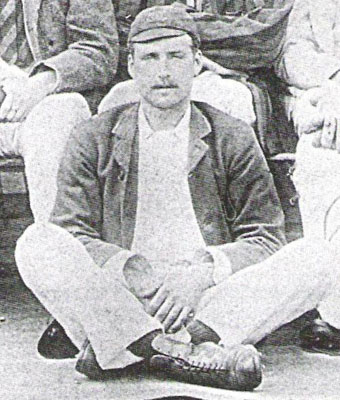 Drummond Hamilton
Drummond Hamilton
Leinster sides had occasionally taken to the field to play touring sides or English counties, but there was an even earlier attempt to have a "best v best" competition.
It's actually more than 120 years ago that the first Inter-Provincial Championship took place, a six-day festival held at Leinster CC in Rathmines.
Interestingly there was an advertisement in the Irish Times on the first day for an insurance company based in Dawson Street called Royal Insurance, later the Royal & Sun Alliance, later still RSA Ireland.
On 15 July 1890 the Irish Times announced that the first day's play had taken place "on a carefully prepared wicket at Leinster CC" - so obviously nothing changes! There was a tiny crowd ("6 pence admission, ladies free") and a word of criticism, too: "whoever was responsible for the organisation of the team for the premier province can hardly be congratulated on the success of his, or their, efforts.
There were no less than five substitutes on the team, and even these five were not on the original list of replacements for the team." Munster were not at full strength either.
Leinster batted first and made 187 in 76 overs, with the main contributors opener David Trotter (43), Edward Fitzgerald (47) and John Nunn (51no). The best analysis fell to Thomas Perrott, with 5-67.
By close of play on day one Munster were 150-3, with Fred Kennedy 57no. They were all out for 241, with local leg-break bowler Joseph Fleming take 7-64. Leinster rattled up 217-5 (SH Guest 58, Fitzgerald 41) and declared, setting Munster 164 to win.
But Fleming's leg breaks accounted for 5-38 and it took Tom Considine and Sir George Colthurst to hold out for a draw, at 95-8.
The second game, between Munster and Ulster, was astonishingly over in a day, with the southern province out for 64 and 25 (Willie Turner 7-29 and 6-9) and the northerners 54 & 36-8. Limerick left hander Malachy Gavin's 19 for Munster was the highest score in the match.
The fourth evening of the festival saw the inaugural meeting of the Irish Cricket Union, which began with great fanfare (a committee of 20 and a whip-round raising £30) but the organisation faded away before being revived in the 1920s.
The first day of the Ulster v Leinster game was lost to rain after half an hour with the hosts on 14-1, but there was enough time on day two to force a result. Edward Fitzgerald made 38 out of 100 all out, before William Booth took 6-16 as Ulster collapsed to 26 all out.
Fitzgerald made his fourth good score of the week - a quick, unbeaten 43not out - and Leinster declared at 75-1. Despite 39 by John Andrews jr, the northern province collapsed to 109 all out. Booth, a slow right-armer, again proved unplayable and took 9-21, with a run-out the ninth wicket to fall.
In 1892 a repeat six-day festival was held, again in Rathmines, when the three sides were Leinster, Ulster and, perhaps surprisingly, Connaught.
There was concern in the press that the host province would not be at full strength: "owing to the assizes being on and the [wandering club] Na Shuler's annual tour, Leinster will not be very strong".
Because of these clashes, the first selection did not include a single Phoenix man, and relied heavily on the host club Leinster, Trinity, and junior sides Dundrum and Workingmen's Club.
Opening the batting was a County Kildare-born student, Clem Johnson, who went on to play Test cricket for South Africa. Leinster piled up a huge 427, with Stuart Smith of the home club making 106, Drummond Hamilton 86 (photo, top right) and Archie Penny of Trinity made 67. Connaught were bowled out twice for 177 and 123, with JJ Ryan talking 2-19 and 7-40.
Connacht, who included several notable Ireland players including two members of the Meldon family, had better luck against Ulster, winning by 63 runs.
The Leinster/Ulster game was over in a day, with Drummie Hamilton making 79 out of a total of 229, and Ulster collapsing to 74 and 132 all out.
Leinster made four changes for this game, bringing in a teenager from the host club called Bob Lambert, who was to play for Ireland from 1893-1930.
There does not seem to have been a repeat of these inter-pro championships, but regular Ulster v Leinster games were played most seasons and Munster joined in at times before the Guinness Cup was formalised.
1890 Championship
P W D L
Leinster 2 1 1 0
Ulster 2 1 0 1
Munster 2 0 1 1
1892 Championship
P W D L
Leinster 2 2 0 0
Connaught 2 1 0 1
Ulster 2 0 0 2
